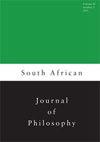Afrocentric education’s foundations of Wangari Maathai’s philosophical (ethical) leadership
IF 0.3
3区 哲学
0 PHILOSOPHY
引用次数: 0
Abstract
The year 2021 marks the 10th anniversary of the passin g of Wangari Maathai, an environmentalist, women’s rights’ activist, Pan-Africanist, African Renaissance advocate and Nobel Peace Prize winner. Throughout her life – as a girlchild in primary school, a professional in higher education, a married woman and a politician – Maathai was confronted by and, in turn, confronted patriarchal practices in Kenya. An examination of Maathai’s life can easily mislead an observer into thinking that since American education certainly gave her a break from a suffocating patriarchal Kenyan environment, the prevailing patriarchy in Kenya is inherently an African cultural practice. Yet, based on Maathai’s own reflections, ethical and justice- orientated Kikuyu culture was a driving factor in her quest for women’s liberation from patriarchy, and her commitment to environmentalism. Cognisant of the foregoing, I argue that prior to colonialism, traditional Kikuyu education in particular, and traditional African education in general, placed an emphasis on the veneration of women. Therefore, in pursuit of continuing struggles for women’s freedom from patriarchy in Africa, I propose that Afrocentric education, from foundation phase to higher education, should be advanced to reclaim women-affirming and venerating African cultures.以非洲为中心的教育是旺加里·马塔伊哲学(伦理)领导的基础
2021年是环境保护主义者、女权活动家、泛非主义者、非洲文艺复兴倡导者和诺贝尔和平奖获得者Wangari Maathai逝世10周年。在她的一生中——作为一名小学女孩、一名高等教育专业人员、一名已婚妇女和一名政治家——玛塔伊一直面临着肯尼亚的父权制习俗,反过来又面临着这种习俗。对马塔伊生活的审视很容易误导观察者,让他们认为,由于美国教育确实让她摆脱了令人窒息的肯尼亚父权制环境,肯尼亚盛行的父权制本质上是一种非洲文化习俗。然而,基于马塔伊自己的反思,以伦理和正义为导向的基库尤人文化是她寻求女性从父权制中解放出来的一个驱动因素,也是她对环保主义的承诺。认识到上述情况,我认为,在殖民主义之前,特别是传统的基库尤人教育,以及整个非洲传统教育,都强调对妇女的尊重。因此,在追求非洲妇女摆脱父权制的持续斗争中,我建议从基础阶段到高等教育,推进以非洲为中心的教育,以恢复妇女对非洲文化的肯定和崇敬。
本文章由计算机程序翻译,如有差异,请以英文原文为准。
求助全文
约1分钟内获得全文
求助全文
来源期刊

SOUTH AFRICAN JOURNAL OF PHILOSOPHY
PHILOSOPHY-
CiteScore
1.00
自引率
0.00%
发文量
19
期刊介绍:
The South African Journal of Philosophy (SAJP) is the official publication of the Philosophical Society of South Africa. The aim of the journal is to publish original scholarly contributions in all areas of philosophy at an international standard. Contributions are double-blind peer-reviewed and include articles, discussions of articles previously published, review articles and book reviews. The wide scope of the South African Journal of Philosophy makes it the continent''s central vehicle for the publication of general philosophical work. The journal is accredited with the South African Department of Higher Education and Training.
 求助内容:
求助内容: 应助结果提醒方式:
应助结果提醒方式:


